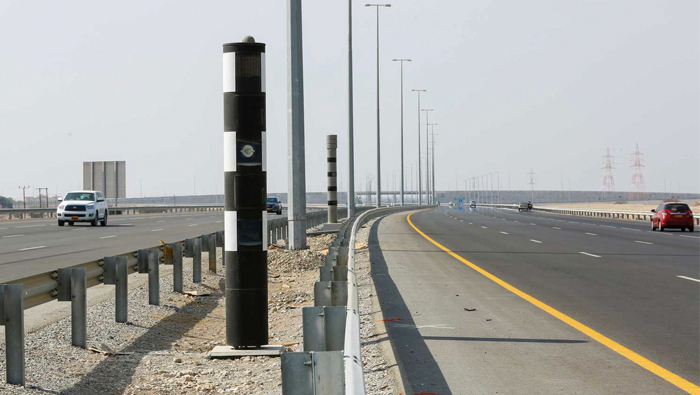
Muscat: The tolerance level for speeding has been removed from some speed cameras in Oman, according to the Royal Oman Police (ROP).
A globally recognised tolerance or grace allowance of 15km an hour above the designated speed limit will no longer apply, especially at accident blackspots. The move is in keeping with ROP’s constant drive to reduce the number of accidents on Oman’s roads.
A grace speed limit of 15km per hour over the maximum stipulated limit is tolerated on some roads in Oman, as speedometers can display different speeds across different vehicles. The ROP has conducted a study to find out which areas are more accident prone, and will now scrap the grace speed limit in these areas, meaning motorists must stick to the limit displayed for that road.
An official at the ROP said: “The grace speed limit is 15 km/hr on each road from the defined speed limits on that road. It depends sometimes on the location, radar device and the vehicle gauge as well. The radar can flash even if the speed is less than 15 kilometres in areas that are prone to road accidents.”
“As part of ROP’s efforts to promote better driving, we do give a grace period to motorists, but they have to abide by the speed limits on roads,” he added.
Earlier this month, Brigadier Mohammed Al Rawas, Director General of the Traffic Department at the ROP, said that the number of accidents reduced by 67 per cent, injuries by 33 per cent, and deaths by 52 per cent.
Al Rawas said, “Traffic accidents resulting from speed accounted for more than 70 per cent of total accidents. Awareness and motorists abiding by speed limits led to a reduction in the number of accidents. Speed radars also contributed to the decline in the number of accidents.”
With regard to the amendment in the executive regulation traffic panel, he clarified that the reduction of accidents required a package of measures, including improvement of the road environment, awareness, and the development of laws.
He added, “The traffic law and its executive regulations came as a result of a study in which everyone participated, making it suitable to make the roads safer and traffic flow smoother for everyone.”
He pointed out that everyone witnessed the inauguration of the traffic service stations in most of the Sultanate’s wilayats, adding, “Everyone can obtain these services without constraints or hardships for long distances, saving time, effort and money, and ensuring easy access to services.”
Amor Al Masroori, a board member of the Oman Road Safety Association, said that this grace speed limit was put in place to account for human error, and added that motorists should not exploit the leniency afforded to them by the ROP.
“The speed limit is set according to the type of road you drive on, the length and width of the road, and the traffic on that road, but I feel there are some people who take undue advantage of this grace speed limit,” he told Times of Oman.
“The laws are there for a reason, and we must follow them. The ROP have given us this grace speed limit because they know that it will not always be possible to stop in time.”
“If people are travelling on a long stretch of road, then I advise them to use cruise control,” added Al Masroori. “That way, you can set your car speed accordingly, and not make mistakes, but if you are travelling short distances or don’t have cruise control, then please be aware and follow the rules, because yes, you could get a fine, but what’s worse is that you could cause an accident.”
Between November 2017 and 2018, there was a 48.3 per cent drop in accidents, according to the National Centre for Statistics and Information. In 2017, 3,845 accidents took place, leading to 3,134 injuries and 640 deaths.